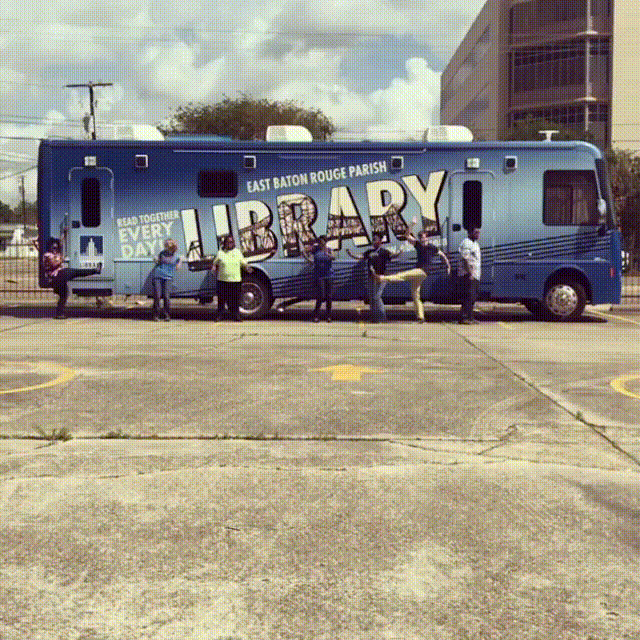We’ll get back to more tales of the mysterious menageries of Internetland soon, but for any of it to matter to us library peoples, we need to be less Sam Lowry from Brazil, and more Peter Gibbons from Office Space (but without all the theft). Here’s how I’ve been learning to smash my printer…
For the past four years, I’ve worked in the Outreach department of our public library. It was started about six or seven years back by two very passionate and driven young ladies. In just a few years, they’d built a thriving, nationally recognized outreach program which is currently home to four full-sized bookmobiles (four!) and about fourteen full-time staff members. Like I said, it’s dadgum impressive.
But as mentioned in the previous post, even something this beautiful:

is still a bureaucratic chunk of a much larger bureaucratic heap, plagued with all the problems and resistance (both internal and external) you’d expect in any other civic office. We’re going to steer clear of the details, suffice to say that we have a red-tape collection that Congress would admire. There’s a massive amount of systematic inertia to overcome if you want to change your desktop background, and before long, you realize that fighting for that big idea is only going piss people off and leave you bitter.
That being said, don’t throw out that idea! You’ll need it to survive…
Instead, find somewhere safe to stash it and let it grow. Like, I don’t know, a blog? Even if you don’t feel inclined to start a blog, find something, or even someone, that reminds you why you’re in the game. It can’t be something static either, like a five year plan (ugh. I hope that phrase makes you gag as much as it does me). It needs to be indulged on a fairly consistent basis, actively provoking your inner idealist and wrestling some concrete details out of him (or her).
But that’s where the whole thing might start bumping up against the real world, which won’t hesitate to eat all your dreams with some saltines that came from a sealed package, clearly marked with staff name and date, in the designated-for-crackers cabinet of the office kitchen. Let the idea stew a while. Maybe find it a few friends and hope that one of the litter survives to maturity.
In my office, I’m cautiously sneaking a few of the more robust ideas out into the light of day. For the sake of illustration, let’s look at two of the ideas I put in the oven sometime in the past year…
Idea #1: Streamline our daily work processes.
Due to the inherently unstructured nature of our department and a whole lot of… let’s say… “reactive policy making”, simply pushing our banana button requires so many extra steps that it would send Savion Glover to the hospital with a charley horse. Any mention that perhaps there might be a better way was dismissed with an indifferent or irritated shrug. I decided to take these shrugs to mean “if you want to do all the extra work of figuring out a new system, knock yourself out, but don’t make my life any more difficult in the process.” I agreed to their unspoken terms and got to work.
Over the next few months, I scribbled in my notebook, compiled and sorted data in Excel and Word, and generally obsessed over the project until I’d worked out a solution. All this occurred under the radar until the plan was pretty well ironed out. But even then, my new system sat on the shelf, unused, for another two months. I knew I couldn’t just throw it out there and expect everyone to start doing things the way I thought they should. That’s a doomed approach in any context, but all the more coming from the lowest paid kid in the room.
Eventually the opportunity came. There had been a minor adjustment to the aforementioned Byzantine system due to personnel changes, and while we were having a meeting to review this particular change, our chief chief posed the question: “Are ya’ll ok with [this change], or is there another way ya’ll would rather do it? I’m open to suggestions.” Now, I know that “another way” and “open to suggestions” were only referring to the application of one tiny change, but it was the first time I’d seen a crack in the door and I couldn’t pass up the opportunity to wedge my foot in. I made my pitch, really selling the fact that it would lighten everyone’s workload across the board, and in case that wasn’t enough, I volunteered to take on the logistical work of actually making the transition.
There was a good, long pause, accompanied by the low hum of lots of neural circuits trying to process the information, before chief chief finally said “ok, sure.” And that was it.
I started working on another similar streamlining project, but it’s been chewed up and swallowed by the bureaucracy demon that roams the stacks from nine to five. Short version: I used the free-trial period of a few workflow automation programs to consolidate all the dozens of loose bits that make up our schedule, and eventually found one that worked. The trial period allowed me to pitch a fully automated proof-of-concept, and everyone was super excited about finally being able to know what the hell is going on at any given time.
But…
The program would cost the library $20, and since it’s a software program intended for in-house staff use (and not patron use), there’s currently no category in the budget to assign the expense. It’s far more complicated, but we’re being told through the can and string that many such budgetary idiosyncrasies will be resolved next year. I’m sure they mean well. In the meantime, I’ll see if I can’t dig up a free work-around.
Idea #2 Extend our current charter school services to develop programming/services for their special education classes.
Two weeks ago I went to the greatest conference in all library-dom: the Association of Bookmobiles and Outreach Services (ABOS) Conference in Pittsburgh, PA. Take the five coolest people from a hundred different library systems and chuck ‘em in a hotel for three days to talk about the library and outreach, and voila! That’s the ABOS conference! I’ll probably get more into this in a later post, but one of the presenters shared the story of their library’s forays into outreach for special needs children. This is something I’d really love to see our library involved in, but there’s not a whole lot of wiggle room in our schedule right now. Something the presenter said about working to build on existing community services, rather than starting your own from scratch, became a spark in that highly combustible “what if” part of my brain.
Our existing services already bring us into our community’s charter schools, where our bookmobiles serve as the school’s library one Friday each month. We’re already there, and we’ve already cultivated relationships with the kids, teachers and administration… how much more time/resources would it require to take that monthly visit to the next level? We could start offering basic, hands-on maker-style activities for the school’s special education classes, or we could do story-times with books that reinforce essential skills like picking out summer/winter clothes, or we could reserve books that align with the curriculum for the class to keep until our next visit…
There’s a lot of potential here, but this idea is still in it’s infancy, and like the previous idea, I’ll need to quietly lay all the groundwork and then wait for the right opportunity before I abruptly unleash it and foist it upon my unsuspecting coworkers. There are worse things to have foist upon you.
